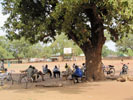
Sudan’s National Electoral Commission, or NEC, this week made official what many analysts on the ground already considered a forgone conclusion: Sudan’s elections will not take place next February as scheduled, and instead have been pushed back to April 2010.
Sudan’s first democratic election in 24 years — a central component of the Comprehensive Peace Agreement that ended the war between the North and the South — was originally scheduled to take place no later than July 2009. This is the second delay of the nation-wide election, a dizzying series of up to 12 ballots in which the Sudanese people will choose their leaders at the local, state, parliamentary, and presidential levels.
The electoral commission attributed the date change to the delay in completing the national census and the need to reschedule voter registration for a time after the rainy season.
As our recent strategy paper on the elections highlights, these concerns voiced by the electoral commission are barely the tip of the iceberg. In “Sudan’s Election Paradox,” Adam O’Brien asked five important questions about Sudan’s ability to carry out credible elections:
- The NCP is notorious for ignoring the rule of law, persecuting dissenting Sudanese voices, breaking existing agreements, and using ruthless force against civilians. Why should international diplomats believe the NCP will behave any differently during the course of an election, and what guarantees and safeguards will be put in place to prevent cheating?
- How can a credible election take place in Darfur at a time when the international community is struggling to maintain even bare minimum levels of lifesaving aid there and more than 3 million people are still internally displaced or refugees?
- How can the national election be credible if a ballot does not take place in Darfur given its significant portion of Sudan’s total population?
- How do elections fit into a broader strategy of promoting the ultimate goals of power-sharing, governance reform, and the political empowerment of larger numbers of Sudanese citizens?
- How can the national election be effectively administered given the complexity of the voting systems, the challenge of conducting voter registration during the South’s rainy season, and the slow pace of voter education efforts?
Unsurprisingly, the movement to confront these major challenges has been painfully slow. Important deadlines continue to pass with little notice. For instance, voter registration was supposed to be finalized by June 1; it is now slated to begin in November, after the rainy season passes. Constituency demarcation was scheduled to begin in April; now, according to a revised timeline from the NEC announced yesterday, “the demarcation of the constituencies would be from Wednesday 10th of June 2009 to Thursday the 9th of July 2009.” No word on how that process is going.
At this rate, even the new April 2010 election date looks quite ambitious.
Maggie Fick and Katherine Wycisk contributed to this post.
Photo: Men gather under a tree in Juba, South Sudan. Enough/Maggie Fick

